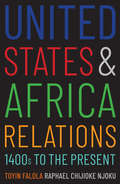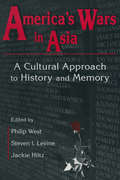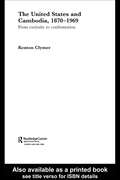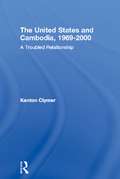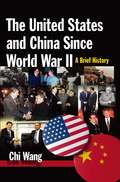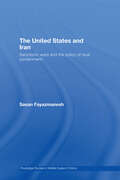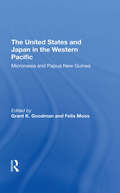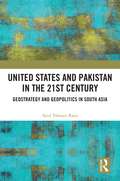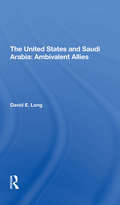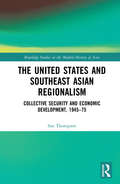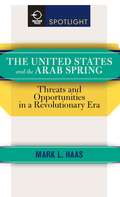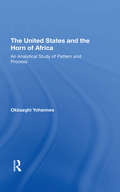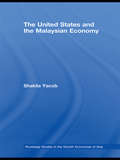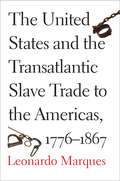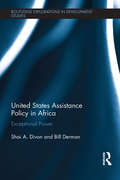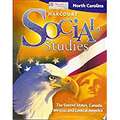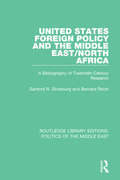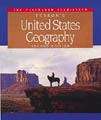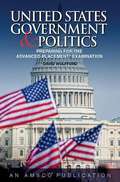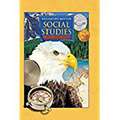- Table View
- List View
United States and Africa Relations, 1400s to the Present
by Toyin Falola Raphael Chijioke NjokuA comprehensive history of the relationship between Africa and the United States Toyin Falola and Raphael Njoku reexamine the history of the relationship between Africa and the United States from the dawn of the trans-Atlantic slave trade to the present. Their broad, interdisciplinary book follows the relationship’s evolution, tracking African American emancipation, the rise of African diasporas in the Americas, the Back-to-Africa movement, the founding of Sierra Leone and Liberia, the presence of American missionaries in Africa, the development of blues and jazz music, the presidency of Barack Obama, and more.
United States and Asia at War: A Cultural Approach
by Philip West Steven I. Levine Jackie HiltzThis text examines the Pacific War, the Korean War and the Vietnam War, from the perspective of those who fought the wars and lived through them. The relationship between history and memory informs the book, and each war is relocated in the historical and cultural experiences of Asian countries.
The United States and Cambodia, 1870-1969: From Curiosity to Confrontation (Routledge Studies in the Modern History of Asia #Vol. 18)
by Kenton ClymerSpanning from the first US contacts with Cambodia in the 19th century up until the late 1960s and the outbreak of war with Vietnam, this book is the first to systematically explore American relations with Cambodia. A discussion of adventurers, tourists and missionaries initially sets the scene for the analysis of official relations which began in 1950.The book traces how relations with Cambodia's king, Norodom Sihanouk, were often troubled as Sihanouk strove to keep his country out of the Cold War even when pressured by the US to join the battle against communism.
The United States and Cambodia, 1969-2000: A Troubled Relationship (Routledge Studies in the Modern History of Asia #Vol. 18)
by Kenton ClymerBeginning with the restoration of diplomatic relations between the US and Cambodia in 1969, this book is the first to systematically explore the controversial issues and events surrounding the relationship between the two countries in the latter half of the 20th century. It traces how the secret bombing of Cambodia, the coup which overthrew Prince Sihanouk and the American invasion of Cambodia in 1970 led to a brutal civil war. Based on extensive archival research in the United States, Australia and Cambodia, this is the most comprehensive account of the United States' troubled relationship with Cambodia.
The United States and China Since World War II: A Brief History
by Chi WangThis book surveys the complicated history of U.S.-Chinese relations. After two brief chapters providing historical context, the focus shifts to the mid-twentieth century, the wartime alliance, the war's bitter aftermath, and the decades since World War II, including the path from normalisation to China's hosting of the 2008 Summer Olympics. The author traces the ways in which the two countries have managed the blend of common and competitive interests in their economic and strategic relationships; the shifting political base for Sino-American relations within each country; the emergence and dissolution of rival political coalitions supporting and opposing the relationship; the evolution of each society's perceptions of the other; and ongoing differences regarding controversial topics like Taiwan and human rights. The author's early years in China, American education, and career as a China expert and an advisor on U.S.-China relations and cultural affairs for over fifty years, have afforded him unique opportunities to observe and participate in the development of this important relationship.
The United States and Iran: Sanctions, Wars and the Policy of Dual Containment (Routledge Studies in Middle Eastern Politics)
by Sasan FayazmaneshWhen and why did the United States policy of containment of Iran come about? How did it evolve? Where is it going? Much has been said about the US policy of dual containment, particularly as it pertains to Iraq. However, there has been little in-depth analysis of this policy when it comes to Iran. Sasan Fayazmanesh explores this often neglected subject by analyzing the history of this policy. The analysis includes the role that the Carter and Reagan Administrations played in the Iran-Iraq war, the numerous sanctions imposed on Iran by the Clinton Administration and the aggressive and confrontational policy toward Iran adopted by the George W. Bush Administration after the events of September 11, 2001. This topical read synthesises a range of primary sources, including firsthand reports, newspaper articles and electronic media, and presents a coherent analysis of the ebbs and flows in the US thinking on Iran and Iraq.
The United States and Its Neighbors (The World Around Us)
by Barry K. Beyer Jean Craven Mary A. McFarland Walter C. ParkerThe World Around Us -1991 -United States and Its Neighbours: Grade 5
United States and Its Neighbors (North Carolina)
by Herman J. Viola Cheryl Jennings Mark C. Schug Charles S. White Sarah Ann Bednarz Carlos E. CortésNIMAC-sourced textbook
The United States And Japan In The Western Pacific: Micronesia And Papua New Guinea
by Grant K Goodman Felix MoosThe interrelationships of the United States and Japan with Micronesia, a U.S. dependency, and Papua New Guinea, a newly independent nation, are the focus of this study. The authors demonstrate that dependence does not by any means automatically terminate by virtue of a legal change in political status. To a surprising extent, Micronesia (the last UN trusteeship) and independent Papua New Guinea depend for their very survival on the United States and Japan. The authors point out that the interests of the United States and Japan in this region too often–and unnecessarily–operate in isolation from one another and in direct conflict. Cooperative U.S.-Japanese efforts are vital in this area; whatever plans are made for the region, they must be island-specific, culturally congruent, politically sensitive, and economically viable.
United States and Pakistan in the 21st Century: Geostrategy and Geopolitics in South Asia
by Syed Tahseen RazaThis book historically maps and examines the evolving, contemporary geostrategic and geopolitical imperatives of the United States within Pakistan and the South Asian region, especially after September 11, 2001. It offers a detailed and theoretical account of the rapidly changing context of US foreign policy towards Pakistan after 2001. The history of the US-Pakistan relationship has been a complex and inscrutable mix of cooperation and conflict has turned even more challenging after 9/11. This book covers the latest developments and relevant themes from world politics as it discusses the impact of the unprecedented rise in religious extremism in Pakistan, stemming from the US War on Terror as well as Pakistan’s economic vulnerability and military dictatorship, India’s offer to support the US in its war in Afghanistan, Pakistan’s nuclear capability, and the US administration’s decision to end financial aid to Pakistan. The study highlights the fact that, from the receding of British influence in the region through the Cold War and post-Cold War phases to the post-9/11 period, US-South Asia policy has been informed by the theoretical paradigm of the grand strategy of primacy. This topical book will be useful to scholars and researchers of international relations, politics, political studies, strategic and defence studies, security and peace studies, foreign policy, area studies, and South Asian studies. It will also interest diplomats, politicians, policymakers, security experts, journalists, and think tanks interested in India, Pakistan, and the United States on issues of international politics, world affairs, and terrorism.
The United States And Saudi Arabia: Ambivalent Allies
by David E. LongU.S.-Saudi relations have been marked by ambivalence since their inception over 50 years ago. The Arab-Israeli conflict, the division between buyer and seller of oil, the superpower-small state dichotomy, and the divergence of cultures, traditions, and perceptions have all contributed to the anomalies that have marked the relationship between the two countries, although mutual interest has, over time, outweighed mutual antagonism. Dr. Long examines the major factors affecting their association—economic, commercial, military, and political as well as oil-related factors—and develops the thesis that each has evolved a unique internal dynamic and an existence independent of the others. It is primarily in times of crisis that the factors have overlapped in the minds of decision makers, Saudi and American alike. The author argues that a knowledge of the development of each individual element is crucial for understanding the intricacies of current U.S.-Saudi relations.
The United States and Southeast Asian Regionalism: Collective Security and Economic Development, 1945–75 (Routledge Studies in the Modern History of Asia)
by Sue ThompsonThe Nixon or Guam Doctrine of 1969 stressed the importance of progress towards regional cooperation and Asian collective security, indicating that Asian countries themselves should take the initiative in creating programs in which the United States could participate. This book analyses the development of United States regional cooperation policy on Southeast Asia and its importance to long-term planning for the region that had been the general aim of successive American post-war administrations. The author demonstrates the link between economic regional cooperation and collective security in Southeast Asia, placing regionalism in an international context by examining the influence United States policy and various important events had on the development of Southeast Asian regionalism. Through the analysis of primary material, including previously classified material, in the United States, the United Kingdom, and Australia and engagement with historiography of war and peace in Southeast Asia, the book puts forward the argument that Southeast Asian regional cooperation was influenced by both American and Asian policy and its development reflected the economic and political transformation of the post-war Southeast Asian landscape. It also examines the developments in British and Australian policy and how developments in Southeast Asia influenced and, in turn, were affected by the policies of the Western powers. Adding to the current discourse concerning the origins of Southeast Asian regionalism, this book will be of interest to academics in the field of Southeast Asian studies, United States political history, international relations and regionalism.
The United States and the Arab Spring
by Mark L. HaasIn this Westview Press Spotlight, Mark L. Haas explores the major political consequences of the Arab Spring protests in North Africa and the Middle East as well as how and why US leaders responded to these developments. A detailed examination of the threats and opportunities to US interests created by the uprisings are prominent in the analysis of the events. Students will learn about the individual protests and aftermath of the Arab Spring as well as the various policies the United States might adopt to best advance US security in the new international environment.The United States and the Arab Spring is an extracted chapter from the Updated 2013 Edition of The Middle East and the United States, Fifth Edition (ISBN 978-0-8133-4914-5), edited by regional experts David W. Lesch and Mark L. Haas. In the full-length edition of the text, scholars and diplomats from the Middle East, Europe, and North America provide an objective, cross-cultural assessment of US policy toward the Middle East and Middle Eastern political history from the First World War through the present.
The United States And The Horn Of Africa: An Analytical Study Of Pattern And Process
by Okbazghi YohannesThe recent collapse of the bipolar world order has been accompanied by momentous changes, dynamically setting the international system in motion toward an uncertain future. Such a profound transformation of the international system mandates an evaluation of American foreign policy and the role of the United States in this radically changed world order. In this insightful new book, Okbazghi Yohannes examines the role of U.S. foreign policy with regard to the four countries that make up the Horn of Africa: Eritrea, Sudan, Somalia, and Ethiopia. The book begins by analyzing the historical patterns and processes of American policy in relation to the African Horn during and after the Cold War, offering a comprehensive description of the fundamental policy choices of the United States and the means chosen to achieve American objectives in the region. Finally, Yohannes considers the extent to which the American role in the African Horn aided or impeded the emergence of political democracy and the promotion of economic development within the region. By juxtaposing this new method of examination with traditional approaches, the book reveals a greater coherence in the structural relationship between U.S. policy and the politics of the African Horn. Skillfully incorporating informative background material regarding the history, politics, and diplomacy of the countries covered by the study, Yohannes addresses the interests of both the specialist and the general reader.
The United States and the Malaysian Economy (Routledge Studies In The Growth Economies Of Asia Ser.)
by Shakila YacobThis book explores the relationship between the United States and the Malaysian economy, concentrating on the period 1870 to 1957, with particular focus on trade flows and foreign direct investment. This is the first book to examine, in depth, US economic involvement in colonial Malaya. Exploring the relationship between the United States and the M
The United States and the Transatlantic Slave Trade to the Americas, 1776-1867
by Leonardo MarquesAn investigation of US participation in the transatlantic slave trade to the Americas, from the American Revolution to the Civil War While much of modern scholarship has focused on the American slave trade's impact within the United States, considerably less has addressed its effects in other parts of the Americas. A rich analysis of a complex subject, this study draws on Portuguese, Brazilian, and Spanish primary documents--as well as English-language material--to shed new light on the changing behavior of slave traders and their networks, particularly in Brazil and Cuba. Slavery in these nations, as Marques shows, contributed to the mounting tensions that would ultimately lead to the U. S. Civil War. Taking a truly Atlantic perspective, Marques outlines the multiple forms of U. S. involvement in this traffic amid various legislation and shifting international relations, exploring the global processes that shaped the history of this participation.
United States Assistance Policy in Africa: Exceptional Power (Routledge Explorations in Development Studies)
by Shai A. Divon Bill DermanFrom the end of WWII to the end of the Obama administration, development assistance in Africa has been viewed as an essential instrument of US foreign policy. Although many would characterise it as a form of aid aimed at enhancing the lives of those in the developing world, it can also be viewed as a tool for advancing US national security objectives. Using a theoretical framework based on 'power', United States Assistance Policy in Africa examines the American assistance discourse, its formation and justification in relation to historical contexts, and its operation on the African continent. Beginning with a problematisation of development as a concept that structures hierarchies between groups of people, the book highlights how cultural, political and economic conceptions influence the American assistance discourse. The book further highlights the relationship between American national security and its assistance policy in Africa during the Cold War, the post-Cold War, and the post-9/11 contexts. This book will be of great interest to students and scholars of Development Studies, Political Science and International Relations with particular interest in US foreign policy, USAID and/or African Studies.
The United States, Canada, Mexico, and Central America
by Michael J. Berson Tyrone C. Howard Cinthia SalinasNIMAC-sourced textbook
United States Foreign Policy and the Middle East/North Africa: A Bibliography of Twentieth-Century Research (Routledge Library Editions: Politics of the Middle East #24)
by Sanford R. Silverburg Bernard ReichThis bibliography, first published in 1990, is a result of a quarter-century professional and personal relationship between two academics interested in Middle East studies. The comprehensive bibliography consists of western, primarily English, language sources published through 1988 and early 1989 concerning foreign policy toward the Middle East and North Africa during the twentieth century. Included are materials that deal directly with the topic, material that has appeared in published form, ie books, monographs, essays and articles. Also included are some non-published items, most importantly American and British doctoral dissertations and master’s theses.
United States Geography
by Fearon'SThis program introduces students to different regions of the United States, the physical and human features of the earth, and cultural topics of special interest that help students of all abilities appreciate American geography and cultures.
United States Government And Politics: Preparing For The Advanced Placement Examination
by David WolffordA one-semester or one-year course, perfect for students preparing to take the AP United States Government and Politics Exam.
United States History: 1565 to Modern Times Grade 5
by James A. Banks Kevin P. Colleary Linda Greenow Walter C. Parker Emily M. SchellTexas Social Studies textbook for 5th Grade
